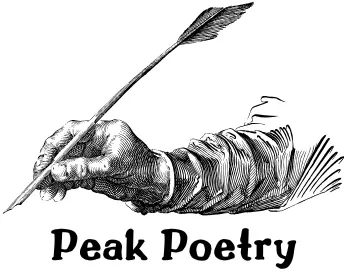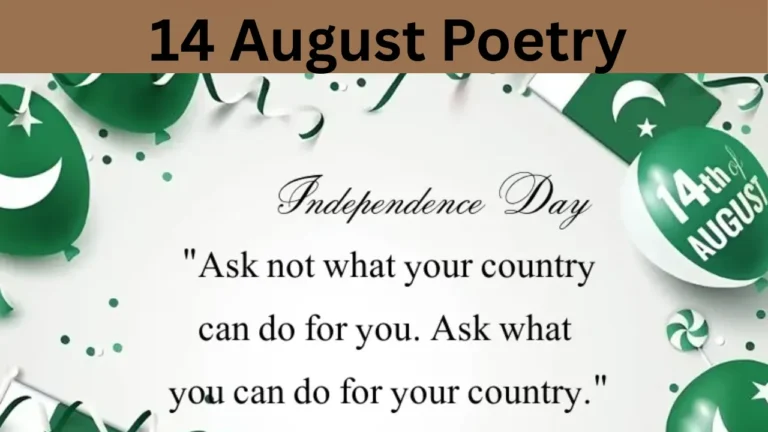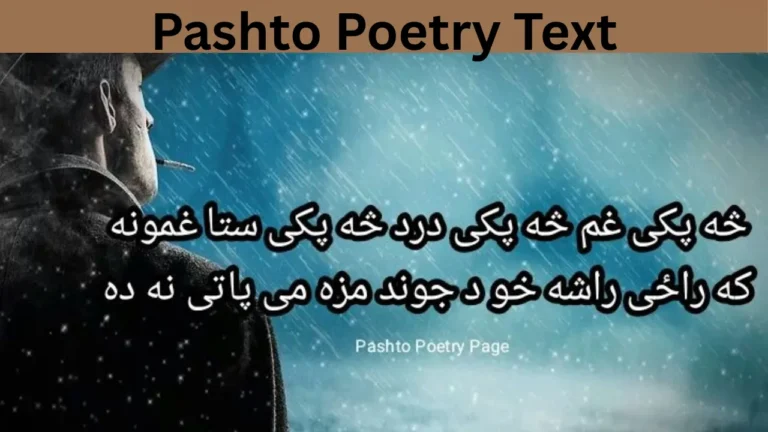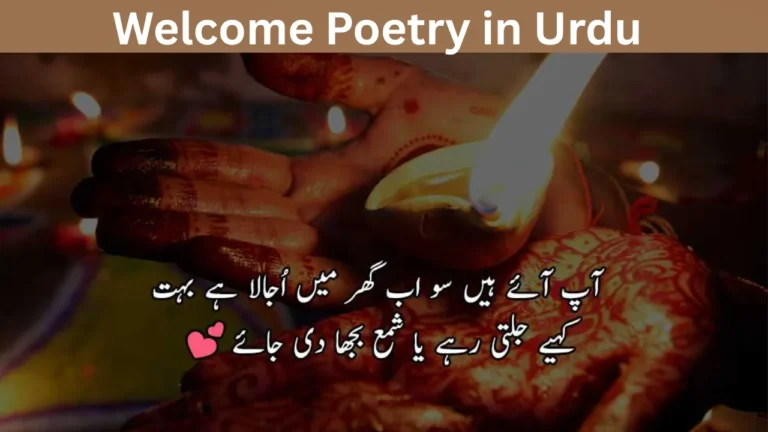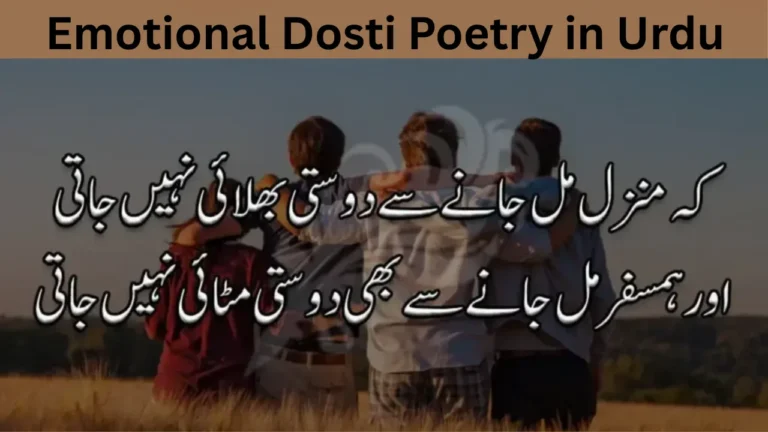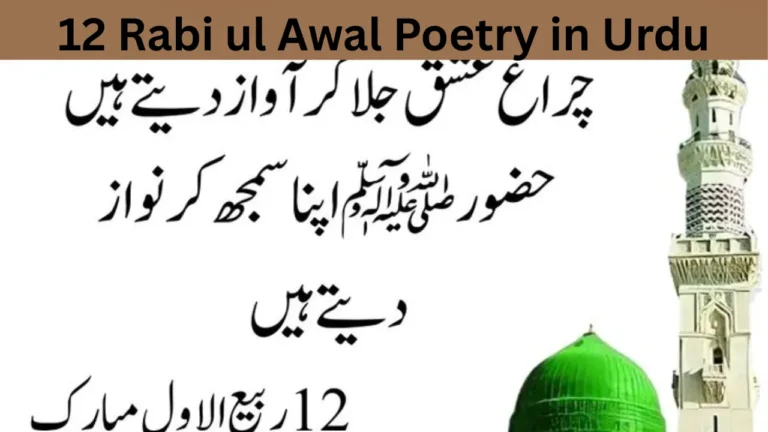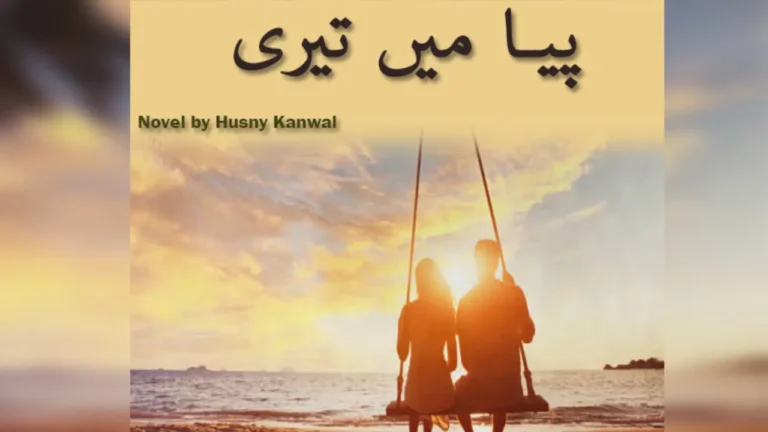Sindhi Poetry The Soulful Voice of Sindh
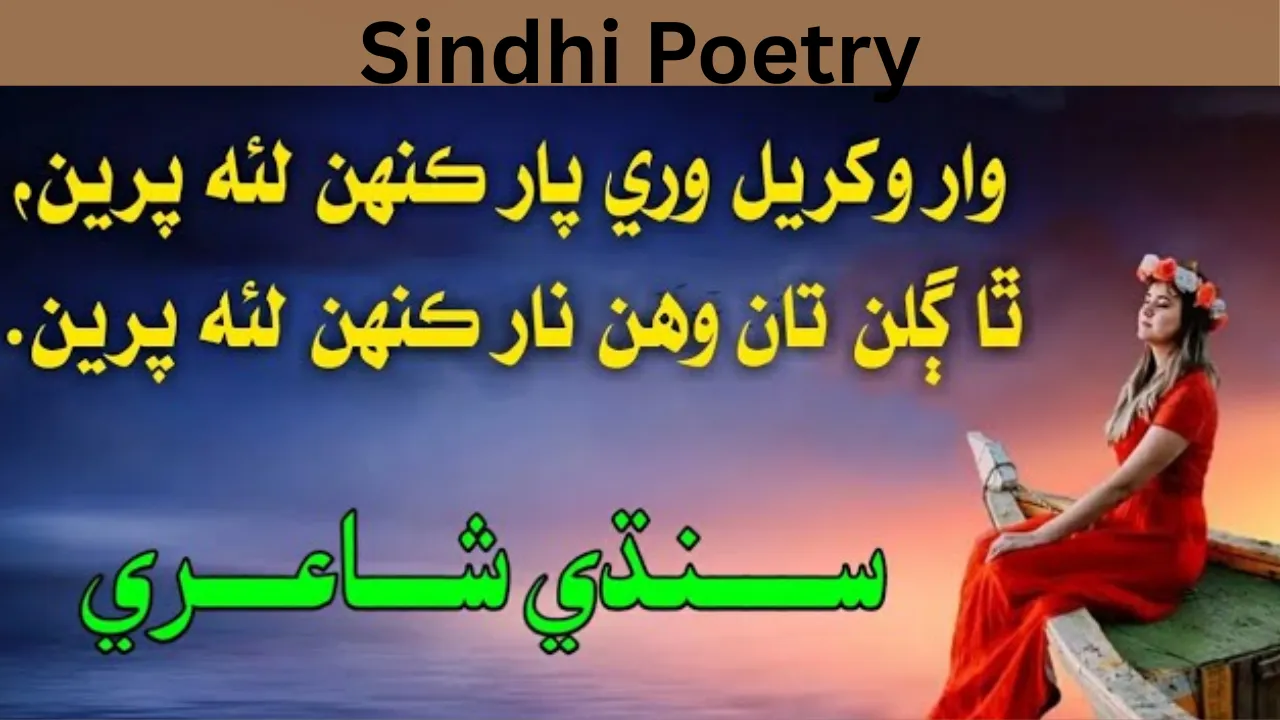
Sindhi poetry is not just literature—it is the heartbeat of a culture. It sings the stories of love, pain, devotion, and nature. Rich in spiritual themes, this poetry reaches deep into the human soul. From the Sufi teachings of Shah Abdul Latif Bhittai to the modern words of Sheikh Ayaz, Sindhi poetry has carved a powerful place in South Asian literature.
This beautiful tradition stands shoulder-to-shoulder with Allama Iqbal Famous Poetry in Urdu: Spirituality, & Unity for its deep connection with the divine and society.
Let’s take a poetic journey through Sindhi poetry—where every verse feels like a whisper from history and a mirror to the soul.
Shah Latif’s Sindhi Poetry: A Voice from the Desert
Shah Abdul Latif Bhittai is the crown jewel of Sindhi poetry. He wrote about the lives of simple people, desert landscapes, and divine love. His verses are still sung in Sindh today.
Poem: Shah Latif’s Desert Song
In the wind, the dunes do cry,
Sassui walks with tears dry.
In her path, no comfort stays,
Only love lights desert days.
Bhittai’s words, like stars, they shine,
Tales of soul in every line.
In Sindh’s heart, his voice will stay,
Guiding lovers every day.
His verses inspire both lovers and spiritual seekers. Through metaphors and folk tales, he teaches the wisdom of oneness with God and nature.
Sufi Echoes in Sindhi Poetry: Songs of the Soul
Sufi themes lie at the heart of most Sindhi poetry. The poet doesn’t just speak to the mind—he speaks to the spirit. Sachal Sarmast, another iconic figure, used poetry to express human love as a reflection of divine love.
Poem: Sachal’s Soulful Flame
No temple, no mosque, no land—
Only love in every strand.
He saw no color, no race,
Just the soul in every face.
In union, we rise above,
Drunk on Sachal’s wine of love.
One with truth, one with flame,
In all hearts, it’s just one name.
Sachal broke all boundaries. His sindhi poetry united people beyond religion, beyond caste. He used poetic beauty to deliver messages of peace and equality.
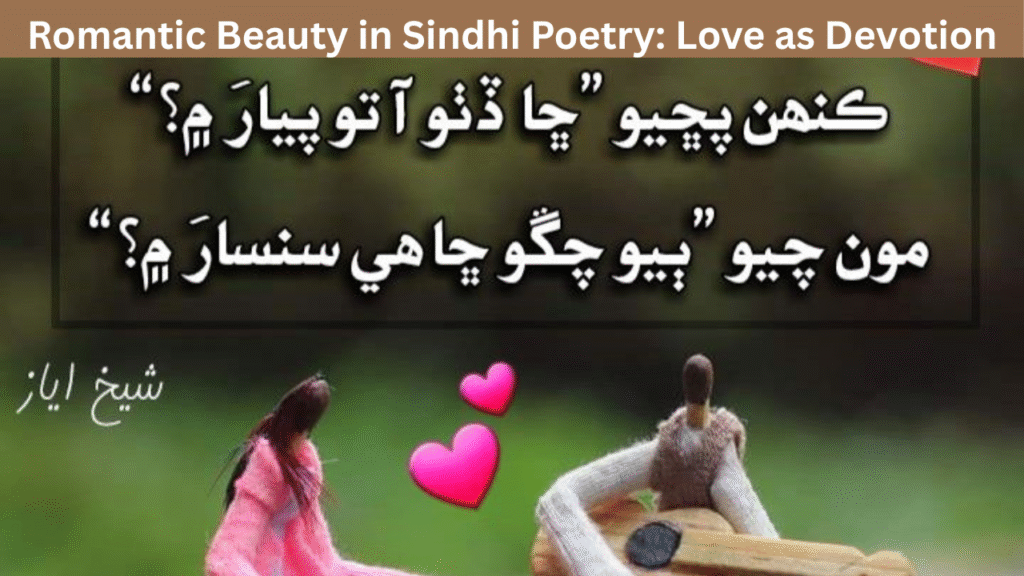
Romantic Beauty in Sindhi Poetry: Love as Devotion
Romance in Sindhi poetry isn’t just about lovers. It’s about longing, passion, and the journey of the heart. The heroines of folklore—Sassui, Marvi, Lila, and Sohni—represent purity, strength, and sacrifice.
Poem: Sassui’s Cry
Oh Punhu, where have you gone?
Across the sands, I walk alone.
My feet bleed but heart won’t stop,
I climb every hill, each rocky top.
Your name I chant like holy prayer,
In pain, I find you everywhere.
My soul burns but won’t retire,
For true love never loses fire.
These love stories carry meaning beyond romance—they reflect spiritual quests. Each character becomes a symbol of devotion, endurance, and inner light.
Sindhi Poetry in Modern Times: The Voice of Sheikh Ayaz
Sheikh Ayaz modernized sindhi poetry by mixing tradition with current issues. He wrote about injustice, identity, and Sindhi pride. He gave voice to people’s pain and dreams.
Poem: Ayaz’s Echo
I speak not for kings or gold,
But for the farmer brave and bold.
My verses are their voice, their call,
Breaking every silent wall.
I cry for truth in every line,
For every dream they call mine.
The dust of Sindh, I kiss each day,
For my words bloom in its clay.
Ayaz’s poetry moved away from old forms and created new waves. He remains a symbol of resistance and dignity in the land of Sindh.
Music and Sindhi Poetry: A Living Tradition
Sindhi poetry is not silent on paper. It lives in songs, in Sufi shrines, in gatherings called “mehfils.” Great singers like Abida Parveen and Allan Faqir turned poetry into music.
Poem: When Songs Speak
Words melt in melodies deep,
In every note, the soul will weep.
Parveen sings what hearts can’t say,
Filling nights and breaking day.
Drums and flutes, they lift the air,
Voices call to what’s fair.
Sindhi poetry in rhythm flows,
In every beat, its meaning grows.
The music makes sindhi poetry eternal. It keeps the language and emotions alive, generation after generation.
Sindhi Poetry and Folk Tales: Legends in Verse
Folk stories in Sindhi literature are not just tales; they are deep metaphors. They represent love, courage, and sacrifice. The tales of Sohni-Mahiwal or Marvi are part of poetry that is passed on like sacred truth.
Poem: Marvi’s Oath
I won’t trade my land for gold,
No palace can my love hold.
They captured me with royal might,
But my roots are my true right.
My desert calls, its winds I hear,
Its soil is my soul, so near.
To Sindh, I bow with every breath,
I’ll guard her till my final death.
These poems are taught in schools, sung in festivals, and remembered in hearts. Sindhi poetry carries the soul of a nation.
The Language of Emotion: Simple Yet Deep
Sindhi poets use easy words to share big feelings. Even a 7th-grade reader can feel the power of their verse. The magic is in their clarity and truth.
Poem: A Simple Heart
I saw her eyes, they spoke of rain,
Clouds inside, hiding pain.
No long lines or fancy song,
Just a heart that missed so long.
In Sindhi, I spoke my part,
She replied in beating heart.
Two lines, one life, one prayer,
Love in air, pure and fair.
This style of writing makes Sindhi poetry very close to Heart Touching Poetry in English 2 Lines: Feelings in Few Words. Both show how short lines can speak volumes.
Table: Major Sindhi Poets and Their Themes
| Poet Name | Time Period | Main Theme | Style |
|---|---|---|---|
| Shah Abdul Latif Bhittai | 17th Century | Divine Love, Folk Tales | Spiritual, Classical |
| Sachal Sarmast | 18th Century | Sufism, Unity, Oneness | Mystical, Metaphorical |
| Sheikh Ayaz | 20th Century | Nationalism, Human Rights | Modern, Bold |
| Ustad Bukhari | 20th Century | Romance, Daily Life | Lyrical, Sweet |
Each of these poets added something unique. Together, they shaped sindhi poetry into a river of words that never dries.
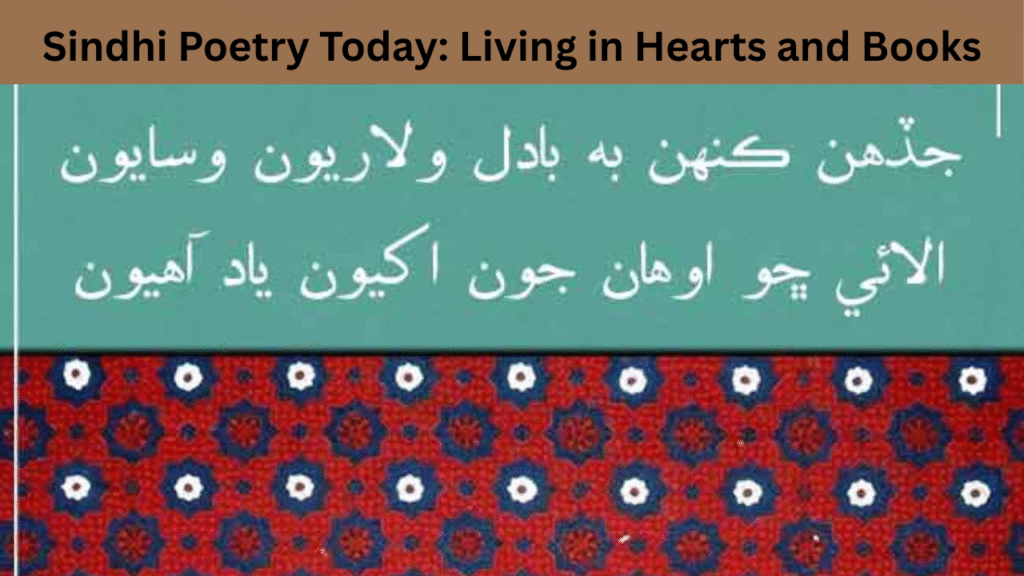
Sindhi Poetry Today: Living in Hearts and Books
Today, poets continue to write in Sindhi. They use Instagram, YouTube, and books to share their thoughts. Modern themes like identity, feminism, and social change mix with old poetic forms.
Poem: Modern Soul
I type my verse on a glowing screen,
Still, my words are old and clean.
Sindh’s soil is in my name,
But my rhymes burn just the same.
I fight with lines, not with guns,
Raise my pen when the injustice runs.
In every post, a history lives,
In every verse, Sindh forgives.
From dusty villages to global cities, sindhi poetry travels without passport. It is loved, learned, and passed down like a jewel.
Final Thoughts
Sindhi poetry is more than just old rhymes. It teaches truth, spreads peace, and gives hope. It stands as a powerful tool for cultural pride and emotional healing. The soul of Sindh breathes through its poetry.
The beauty of sindhi poetry lies in its simplicity, depth, and timelessness. It doesn’t need to shout. It only needs to be read, sung, and felt.
Poem: The Last Verse
Read these lines with your eyes closed,
Feel the love that Sindh composed.
Every poem is a mother’s song,
Calling you back where hearts belong.
So let the winds of Sindh now play,
And take your pain far away.
For in these verses pure and free,
Lives a world where souls agree.
